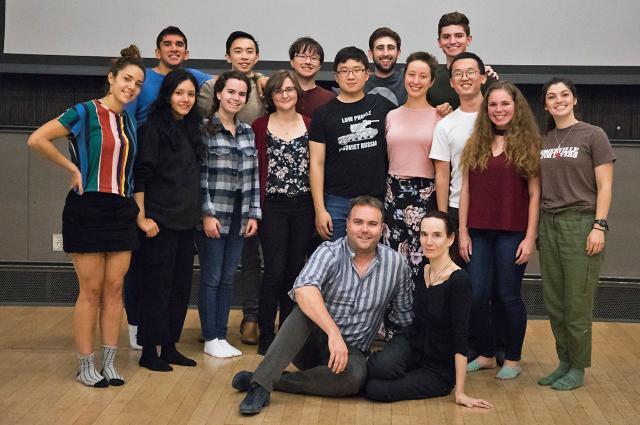Argentine Tango: Culture, Music, and the Dance

The class poses for a picture after an evening of practicing tango. Photograph by Siddhant Talwar, Class of 2023.
Argentine Tango: Culture, Music, and the Dance immerses students in the entire experience of the tango, from learning about its history and Latin American culture to practicing the dance itself. Wisniewski describes how the course is designed to give students both the opportunity to study the history of tango culture – from its beginnings in the late 19th century to its most contemporary iterations in the 21st – and the chance to learn the dance through studio workshops that train them every week in the rudiments of "tango salon." It makes curricular what is often taught as a co-curricular, and in so doing, heightens the attention paid to the subject for students and scholars working on Latin American popular culture. Students learn how issues of Latin American culture and politics are reflected in the dance and vice versa.
Through intellectual and practice-based activities, students are learning about the rich and renowned art of the dance and music of tango, which originated in Argentina and Uruguay. Wisniewski notes how "tango has become an international phenomenon, so studying it as an art form means also studying broader questions of migration, nationalism, and cosmopolitanism." In addition to its beauty, the art of tango provides the opportunity to study Latin America and globalization while building cultural understanding and empowerment.
Wisniewski taught an earlier iteration of this course at the ExCollege in Fall 2015, and he has since traveled to Buenos Aires and incorporated new material from the tango capital. His interest stems from his background in music and dance. Wisniewski was trained as a classical saxophonist, and as an undergraduate he had a teacher who introduced him to tango music. Since then, he has traveled to Argentina annually to study and perform tango as a musician and a dancer. He founded and directs the Harvard Argentine Tango Society, and frequently brings professional dancers and artists to his ExCollege course.
In class, students have given presentations on different aspects of the tango: one group researched and presented on depictions of the tango in Hollywood, and another on the codes of the milonga, events at which the tango is danced. Throughout the semester, students will complete research papers drawing on scholarship within and outside Argentina, as well as creative projects ranging from film to choreography to creative writing to performance art. Of course, students are enjoying dance lessons, as well, and Wisniewski explains how "they are acquiring technique, rhythm, and close listening skills."
Though the class ends in December, Wisniewski believes "an apprenticeship to the dance is a lifelong endeavor." Dance on!